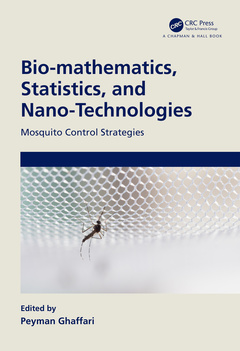Bio-mathematics, Statistics, and Nano-Technologies Mosquito Control Strategies
Coordonnateur : Ghaffari Peyman

Finding effective methods for mosquito control remains one of the great global challenges facing this generation. Bio-mathematics, Statistics and Nano-Technologies: Mosquito Control Strategies brings together experts from a large array of disciplines in order to provide a comprehensive overview of cutting-edge techniques to model, analyse and combat mosquito-transmitted vector-borne diseases.
Features
- Includes multiple case studies
- Suitable for scientists and professionals working on methods for mosquito control and epidemiology
- Provide a much-needed focal point for interdisciplinary discussion
1. Introduction and Overview. Section I. Control of Mosquitoes and Their World: An Overview. 2. Practical Control Methods and New Techniques for Mosquito Control. 3. Concepts of the Best Management Practices for Integrated Pest, Mosquito, and Vector Management. 4. Overview of Personal Protection Measures Through the Innovative Use of Repellent-Textiles. 5. Biology, Surveillance and Control of Mosquito Vectors. Section II. Mathematical Modelling Immunity: An Overview based on Malaria. 6. Models of Acquired Immunity to Malaria: A Review. Section III. Mathematical Epidemiology including Mosquito Dynamics and Control Theory. 7. Multi-strain Host-vector Dengue Modelling: Dynamics and Control. 8. Mathematical Models and Optimal Control in Mosquito Transmitted Diseases. Section IV. Topological Studies: Topology Meets Mosquito Control. 9. On The Shape and Design of Mosquito Abatement Districts. Section V. Chemometric and Mathematical Approach for Modelling and Designing Mosquito Repellents. 10. A Multiplatform Chemometric Approach to Molecular and Mathematical Modeling of Mosquito Repellents. Section VI. Pharmacy Meets Mosquito Control: Using Pharmacological Tools Combating Mosquito Transmitted VBDs. 11. Pharmacological Approach to Combat Mosquito Transmitted Malaria. Section VII. Using Natural Oils Combatting Mosquitos: An Overview. 12. Plant based Repellents: Green Mosquito Control. 13. Micrcencapsulation of Essential Oils for Antimicrobial Function and Mosquito Repellency. Section VIII. Textiles and Paints as Mosquito Control Tools. 14. Mosquito Repellent against Anopheles SPP. and Aedes Aegypti on Cotton Fabric. 15. Silica-Based Organic-Inorganic Hybrid Treatments as Anti-Mosquito Textile Finishing. 16. Cotton and Polyester Fabrics Plasma Coated with Hydrogenated Amorphous Carbon Films. Section IX. Testing Methods for Treated Textiles with Mosquito-Repellents: An Overview. 17. Testing Methods for Mosquito-Repellent Treated Textiles. Section X. Case Studies: Putting the Knowledge into Action. 18. A Case Study: How the Rephaiah Project Combats Malaria in Young Children. 19. Strengthening the control of mosquito vectors in Cabo Verde; New Approaches to Improve Intervention Strategies.
Dr Peyman Ghaffari received his Ph.D. in Mathematical-Physics (Non-linear Dynamics and Complex Systems) at Imperial College (London) 1997. He also received his M.S. (German Diploma in Physics) 1993 in Theoretical Plasma Physics at University of Düsseldorf (Germany). After completing his PhD at Imperial College, he worked as an industrial consultant in Germany and UAE for 12 years focusing on establishing Joint-Ventures between International companies wanting to penetrate the Middle Eastern and European markets.
In 2006 Dr. Ghaffari returned to academia as a visiting/associate scientist at Imperial College, parallel to his consultancy. In 2007 he co-founded the "Complexity and Interdisciplinary Research Centre (CIRC)" at Imperial College providing a platform to transmit the ideas of "Complexity Research" into Industry.
Since March 2010 until Dec 2018, he has worked at the University of Lisbon in the Biomathematics and Statistics Group and has participated in several scientific projects resulting in associated scientific articles. Since 2020 he is continuing his research as an associate researcher at CIDMA (University of Aveiro).
In June 2017 he won the prestigious EU- COST Grant (CA16227) as proposal writer (estimates for 4 years ca. 700.000 Euro). Since Sept. 2017 he has been the Chair of this Action (www.imaac.eu) with around 100 members in around 35 countries involved.
He also founded a yearly Training School ("International Training School on Optimal Control Theory and Mosquito Control Strategies") in 2018 and a yearly conference in 2019 on Political Decision Making and Vector-Borne Diseases aiming to bring political decision makers and scientists together.
Dr. Ghaffari is working now on application of Optimal Control Theory on deterministic and stochastic epidemiological models. Other scientific interests include Complex Systems, Self-Organization, Fractional Derivatives, Neuronal Networks and Industrial Mat
Date de parution : 08-2023
17.8x25.4 cm
Thèmes de Bio-mathematics, Statistics, and Nano-Technologies :
Mots-clés :
mosquito; mosquito-transmitted; vector-borne diseases; malaria; dengue; IMAAC; visceral leishmaniasis; Adult Mosquitos; Mosquito Control; Mosquito Repellency; Aedes Aegypti; Indoor Residual Spraying; Essential Oils; Culex Pipiens; Vector Borne Diseases; West Nile Virus; Ordinary Differential Equations; Aedes Albopictus; Cerebral Malaria; Vector Mosquitos; Percentage Repellency; Endemic Equilibrium; CDC Light Trap; Insecticide Treated Bed Nets; UV Protection; Sand Flies; SEM; Lymphatic Filariasis; Textile Samples; Backward Bifurcation; Lavandula Angustifolia; Lavender



